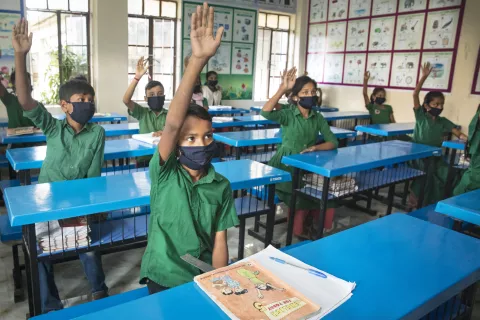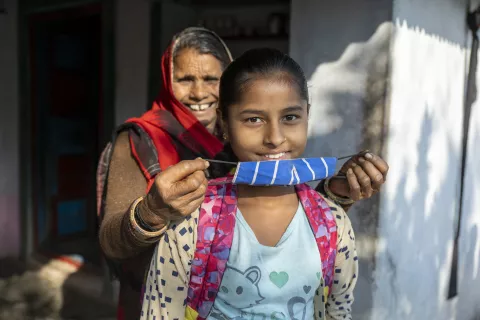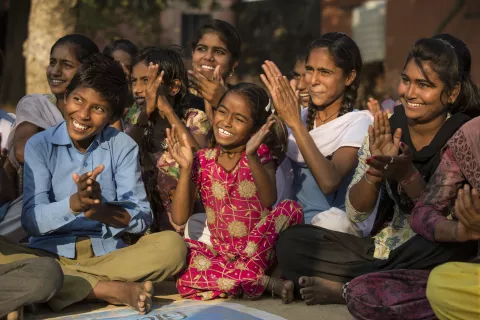Bangladeshi children share experiences of remote learning and the challenges they face
Students call for safe reopening of schools to prevent further disruption to their education

Around 42 million children continue to be affected by COVID-19 school closures in Bangladesh, leaving students with little option but to rely on remote learning. However, not all students have access to digital technology and in many cases, students find virtual classes fall short of their expectations and learning needs.
In a recent focus group discussion with UNICEF, students representing all eight divisions in Bangladesh unanimously agreed that while remote learning is helping them remain in touch with their academic studies, it is fraught with many challenges.
Online vs offline learning
“In comparison to the classroom, online learning lacks the required academic direction, assessment and inter-activeness. Our classes are often affected by poor internet connectivity, data expiry and power outages,” said Nishat Tahiya Promi, a 14-year-old student.
Other students shared concerns about the long-term impact of protracted school closures and the negative effects on children’s education, wellbeing and future.
“Remote education cannot be a long-term solution for continuous learning. School is not only a place for academic activity, it is a hub for many co-curricular activities. We are fast losing our social skills and talents due to excessive dependence on technology,” highlighted Tajbir Zihad Shaikat, a 14-year-old student.
Rumours and uncertainty around school reopenings and resumption of examinations have been a major cause of anxiety for students during the pandemic.
“The government should give clear public announcements on these issues so that we are not left in a state of confusion triggered by misinformation from different news sources,” said Mosaddek Billah Jitu, a 17-year-old student.

Unequal access
The focus group participants agreed that the majority of students from rural areas and marginalized socio-economic backgrounds are unable to access remote learning opportunities through television, radio, internet and smartphones as many do not have access to these devices.
A UNICEF-International Telecommunication Union (ITU) report, found that 63 per cent of Bangladesh’s school-age children have no internet access at home. The findings underscore the need to close the digital divide and address underlying inequalities that disenfranchise marginalized communities and perpetuate cycles of intergenerational poverty.
“Incomes have plummeted in many households during the pandemic. Some parents are unable to support their children’s education in the same way as before. For parents who are daily wage earners, the situation is even more desperate,” said Yaad Mohammed, a 17-year-old student.
To make remote education more accessible, students recommended lowering internet data tariffs and providing free access to learning platforms.
Many students appreciated the quality of the learning broadcasts on national television and recommended modules be extended to higher secondary level students so that all students can benefit.
UNICEF helps create a level playing field
From the onset of the pandemic, UNICEF supported the Government of Bangladesh to develop and implement a strategy on remote learning using multiple platforms including television, radio, internet and mobile phones to cover all streams of education – formal, non-formal, religious and technical education.
“To reach marginalized students and create more equitable access to remote learning, UNICEF is facilitating learning using basic mobile phones and text messages instead of smartphones,” said Iqbal Hossain, Education Specialist, UNICEF Bangladesh.
“However, we continue to face challenges as some children do not have access to basic mobile phones. UNICEF is working with the Government of Bangladesh to deliver a printed learning package to these children’s doorsteps, so no child is left behind,” Hossain added.

Looking ahead
Narrowing the digital divide for children and youth around the world requires urgent action. Even before the pandemic, an ever-growing number of young people needed to learn transferable, digital and entrepreneurial skills to compete in an increasingly digital, interconnected world.
Through the Giga initiative, UNICEF and ITU aim to address the learning crisis and transform education by giving children and young people equal access to quality digital learning. The overall goal is to connect every school in the world to the internet and every student to information, opportunity and choice by 2030.
“As we scale up our education programme, we must listen to the voices of children and young people so we can continually improve the quality of education - whether it’s online or in person. In this case, students are our best teachers,” said Nor Shirin Md Mokhtar, Chief of Education, UNICEF Bangladesh.




